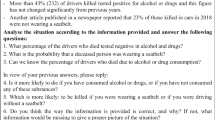Abstract
In this article, a study is reported in which 11–13 year old students are explicitly required to consider a limited set of alternative continuations of a text. Examination of their choices and protocol analysis of the verbalizations of their motives gives insight into their problems and their reasoning while constructing a coherent text. This analysis results in a description of three levels of reasoning by the subjects. Level 1 is characterized by implicit, local reasoning, and a focus on the concrete events in the text. Leve 2 is characterized by more attention to global text characteristics and by more elaborative statements. Level 3 involves considerations on the function of sentences, resulting in more attention to abstract connections between text elements. The type of reasoning is mainly elaborative, and involves many aspects of the text. This research is carried out in the perspective of the development of a computer program that can adequately monitor text production and correct problems related to coherence.
Similar content being viewed by others
References
Anderson, J. R., Boyle, C. F., Farrel, R., & Reiser, B. (1987). Cognitive principles in the design of computer tutors. In P. Morris (Ed.), Modelling cognition, (pp. 93–133). New York: Wiley.
Bereiter, C., & Bird, M. (1985). Use of thinking aloud in identification and teaching of reading comprehension strategies. Cognition and Instruction, 2, 131–156.
Bereiter, C., & Scardamalia, M. (1987). The Psychology of written composition. Hillsdale, N.J.: Lawrence Erlbaum.
Cicchetti, D. V., Lee, C., Fontana, A. F., & Dowds, B. N. (1978). A computer program for assessing specific category rater agreement for qualitative data. Educational and Psychological Measurement, 38, 805–813.
Cooper, C., & Matsuhashi, A. (1983). A theory of the writing process. In M. Marthlew (Ed.), The psychology of written language. New York: Willey.
Damon, W., & Phelps, E. (1989). Critical distinctions among three approaches to peer education. International Journal of Educational Research, 13 (1), 9–19.
Fitzgerald, J., & Teasley, A. B. (1986). Effects of Instruction in Narrative Structure on Children’s Writing. Journal of Educational Psychology, 78, 424–432.
Halff, H. M. (1988). Curriculum and Instruction in Automated Tutors. In M. C. Polson & J. J. Richardson (Eds.), Foundations of Intelligent Tutoring Systems (pp. 79–108). Hillsdale, N.J.: Lawrence Erlbaum.
Hull, G. (1987). The editing process in writing: A performance study of more skilled and less skilled college writers. Research in the Teaching of English, 21, 8–29.
Mann, W. C., & Thompson, S. A. (1988). Rhetorical Structure Theory: Toward a functional theory for text organization Text 8 (3), 243–281.
Matsuhashi, A. (1982). Explorations in the real-time production of written discourse. In M. Nystrand (Ed.), What writers know: The language, process, and structure of written discourse (pp. 269–290). New York: Academic Press.
Scardamalia, M., & Paris, P. (1985). The function of explicit discourse knowledge in the development of text representations and composing strategies. Cognition and Instruction, 2, 1–39.
Williamson, M. M., & Pence, P. (1988). A comparative study of handwriting and word processing in the revising process of first-year college writers. Paper presented at the AERA — conference, New Orleans, april 1988.
Author information
Authors and Affiliations
Rights and permissions
About this article
Cite this article
Andriessen, E.B. Children’s reflection on coherence during text construction. Eur J Psychol Educ 6, 257–266 (1991). https://doi.org/10.1007/BF03191943
Received:
Published:
Issue Date:
DOI: https://doi.org/10.1007/BF03191943




